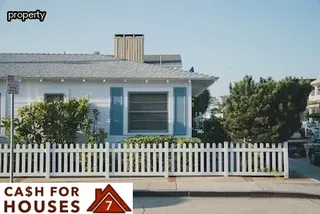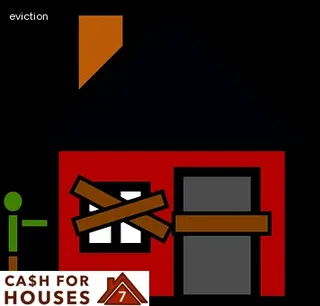It is important to understand squatters’ rights in Indiana before investing in real estate and housing in the state. Squatters, who are also known as adverse possessors, are individuals who take possession of a piece of property without consent from the owner and without paying rent or having any legal right to do so.
In order for squatters to gain title to the property, they must meet certain requirements under Indiana law. Squatters must occupy the property for at least 10 years, pay all taxes due on the property, maintain it properly and not abandon it.
Additionally, squatters must show that they have made improvements to the property and that they have been using it openly and continuously while also claiming exclusive ownership of it. It is important to keep an eye out for signs that someone may be squatting on your land or your potential investment's land in order to avoid any costly litigation in the future.

Squatting has been defined as occupying a property without the legal right to do so, while trespassing is the unauthorized entry onto another's property. It is important to understand the difference between these two concepts, particularly in Indiana where squatting is a growing issue.
Squatters have traditionally been seen as those who occupy abandoned or foreclosed properties, but they can also stay in occupied homes with permission from the occupant. Trespassers, on the other hand, are usually non-residential individuals who enter a property illegally and without permission.
They do not necessarily seek to occupy or remain on the premises for an extended period of time. In Indiana, squatters may be able to establish rights through adverse possession if they meet certain requirements such as paying taxes and maintaining the property for a certain number of years.
However, squatters will still be considered trespassers if they are found on someone else's property without permission and could face legal action. It is important to understand both concepts in order to protect your rights as an owner or tenant of real estate in Indiana.
In Indiana, the term ‘squatter’ applies to someone who occupies a property without permission from the owner or legal right to do so. The concept of a squatter in Indiana is different from other states and can be legally complicated.
On the other hand, a holdover tenant is someone who continues to occupy a property after their lease has ended without permission from the landlord. Squatters and holdover tenants share some similarities, but also have distinct differences.
Squatting rights in Indiana are based on common law principles, which allow for a person to gain possession of real estate through continuous occupancy for an extended period of time. If the landlord does not take appropriate action within the required time frame (usually 2-3 years), then that squatter may be able to obtain legal title to that property by filing an adverse possession claim in court.
In comparison, holdover tenants do not qualify as squatters because they already had permission to occupy the property but failed to vacate at the end of their lease agreement. As such, landlords can evict them with written notice and no court order is required.
However, these tenants may also be able to sue their landlords if they’ve caused any harm while occupying the premises or withheld rent payments due to poor living conditions. Ultimately, it’s important for both landlords and occupants understand how squatters' rights work in Indiana and differentiate between squatters and holdover tenants when dealing with real estate matters.

In Indiana, understanding the legal concept of adverse possession is critical for real estate owners and those seeking to purchase or rent a home. Adverse possession is a law that allows someone who has been occupying land without the owner's permission to gain title if certain conditions are met.
In Indiana, these conditions include continued occupation of the land for at least 10 years, payment of all taxes on the property during this time period, and proof that they have openly used the property as their own. If all these requirements are met, a squatter may be able to claim legal ownership of the property.
It is important to note that any claims made under adverse possession must be brought before an Indiana court in order to be valid, so it is always best to seek legal advice before attempting this route. Additionally, it should be noted that there are restrictions on which types of real estate can qualify for adverse possession in Indiana and thus it is important for both buyers and sellers to understand these laws before entering into any agreement.
Understanding the color of title ownership in Indiana is important when it comes to squatting. This concept relates to the legal notion that a person has rights over a property based on the fact that they have occupied it for a certain amount of time. In Indiana, the requirements to establish color of title ownership are outlined in IC 32-21-1-
This states that an individual must occupy and possess real estate or housing for twenty years uninterrupted in order to gain color of title rights. The law also states that during this period, the individual must pay taxes, make improvements, act as if they were the true owner, and not be dispossessed by any rightful owner or claimant. If all these conditions are met, then the squatter will have acquired some legal rights to the property. However, this does not give them complete ownership - only certain limited rights such as exclusive possession and use over the property. Therefore, understanding color of title ownership laws in Indiana is essential for those looking to understand their squatting rights and how they relate to real estate and houses in this state.

When faced with the unwelcome presence of a squatter on your property, it is important to understand the laws in your state that provide guidance on how to effectively and legally remove them. In Indiana, there are several steps one can take to remove unwanted squatters from their property.
The most common solution is for the owner to give notice that the squatter must vacate within a certain specified amount of time. If they fail to comply, then the person or entity responsible for the property can file an eviction lawsuit against the squatter.
Additionally, if the squatter has caused any damage to either personal or real estate property, it may be possible to seek compensation through civil court proceedings. It is also advisable for owners of real estate and houses in Indiana to ensure that all security measures are in place and that locks are changed regularly as this helps prevent squatters from entering and occupying a property without permission.
Ultimately, being aware of your rights as an owner under Indiana law will help you protect your home and take appropriate legal action if necessary.
Landlords in Indiana must be aware of the legal rights of squatters on their property. Squatters are individuals or groups who occupy a house or other real estate without any legal right to do so.
It is important for landlords to understand what steps they can take if they suspect someone is squatting on their property, as this can lead to costly legal battles. Landlords should first assess the situation and determine whether there is an actual squatter present, as opposed to a tenant with an unauthorized sublet, a trespasser, or someone claiming adverse possession.
If it is determined that the person living on the property is indeed a squatter, landlords should obtain proof that the person does not have any legal right to be there, such as by taking pictures of the premises or recording statements from witnesses. The landlord should then notify the squatter that he or she must leave the premises immediately and provide evidence of ownership of the property.
If these steps are ignored and squatters remain on the land, landlords can pursue eviction through both criminal and civil court proceedings. In Indiana, landlords may also file a lawsuit against squatters for damages caused to their property while they were living there without authorization.

DoorLoop is a great way to get free downloads and streamline time-consuming tasks related to understanding squatters rights in Indiana. The platform offers an extensive library of resources that include legal documents, interactive tutorials on eviction procedures, and detailed guides on the rights of landlords and tenants.
With DoorLoop, users can easily locate all relevant information about the laws surrounding real estate and houses in Indiana, quickly find answers to common questions about squatting, and access helpful resources for both landlords and tenants. Moreover, DoorLoop provides an easy-to-use system that allows users to quickly create customized documents based on their specific needs.
As a result, users can take advantage of this comprehensive service without spending too much time or money.
DoorLoop offers a unique and powerful solution to real estate investors in Indiana who are looking to make more money through the understanding of squatters’ rights. Through DoorLoop, investors can quickly learn about the laws and regulations surrounding squatting, as well as how to apply them to their own investments.
With access to a comprehensive database of both state and local laws, DoorLoop provides an easy way for investors to stay informed on the latest news regarding squatter’s rights in Indiana. Additionally, investors can use DoorLoop’s resources to quickly identify potential targets for investment and make more informed decisions when it comes to investing in real estate or houses.
With its easy-to-use interface and helpful features, DoorLoop is the perfect tool for anyone looking to maximize their return on investment while taking advantage of the protections offered by squatter’s rights in Indiana. Requesting a demo from DoorLoop is an essential step for any real estate investor looking to make more money with greater confidence.

DoorLoop is an online platform that provides helpful information on the legal rights of squatters in Indiana. The sign up process with DoorLoop is simple and straightforward.
To register, users must provide their full name, email address, and phone number. They also must agree to the Terms & Conditions before they can access all the features of the website.
DoorLoop's Terms & Conditions are designed to protect user data, ensure privacy, and outline what type of content is acceptable and unacceptable. By signing up for DoorLoop, users are agreeing to abide by these terms so they can use the website without any issues or concerns about data security.
With DoorLoop's comprehensive understanding of squatters' rights in Indiana, real estate owners can rest assured knowing their property is protected from any potential legal disputes or complications arising from squatting.
If you own a property in Indiana and want to evict a squatter, there are several steps you need to take. First, contact the local police and file a complaint against the squatter.
This will help build your case and provide evidence of the squatter's presence on your property. You must also serve an eviction notice that outlines the reasons for eviction and provides a timeline for them to vacate the premises.
If they refuse to leave, you can file an unlawful detainer lawsuit with your local court, which will allow the court to decide if they must be evicted or not. After filing the lawsuit, the court will issue a writ of possession for enforcement by law enforcement if necessary.
In some cases, you may need to obtain an injunction from the court in order to have law enforcement remove the squatter from your property. Ultimately, it is important to understand all of your rights as a property owner and consult an attorney if needed when dealing with squatters on your Indiana property.

Under Indiana law, a squatter must occupy the property for at least seven years in order to establish squatters' rights. This window of time is the shortest amount of time a squatter can occupy a property before establishing legal rights over it.
In order for a squatter to gain ownership of the property, they must show that they have made continual improvements and paid taxes on the land during this seven-year period. The state also requires that an individual who wishes to claim squatters' rights must demonstrate that their occupancy was continuous, exclusive and open and notorious.
If these conditions are met, then the squatter will be granted legal possession of the real estate or house.
Yes, Indiana does have a law that governs the acquisition of title through adverse possession. This law is known as the Indiana Adverse Possession Statute.
In order to acquire title by adverse possession, an individual must meet certain criteria and possess the property in question for a period of time specified by statute. The requirements include actual and visible occupancy of the property for a continuous period of at least ten years, with payment of all taxes due on the property during that time.
Additionally, the individual must show clear and convincing evidence that they intended to possess the property in such a manner as to exclude all others from it, including its rightful owner. If these elements are met, title may be acquired through adverse possession in Indiana.
Are squatters rights OK? In Indiana, it depends on the situation. Squatters rights are real estate and house laws that allow someone to take over a property without paying for it.
This can happen if the owner of the property is not around or unaware of the person taking over their home. In Indiana, squatters rights are recognized in certain circumstances such as when an individual has been living on a property for seven years or more and has made improvements to the land.
These rights can also be established if an individual has paid taxes and utilities on a property for seven years or more. It is important to note that squatters rights do not provide legal ownership of a property, but they do give those living on a property certain protections from eviction by the rightful owner.
Understanding what constitutes squatters rights in Indiana is key to avoiding any potential legal issues related to real estate and houses.